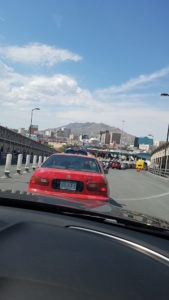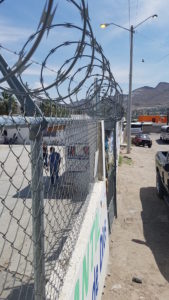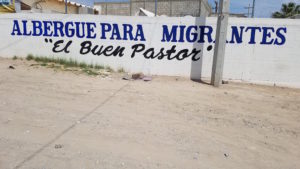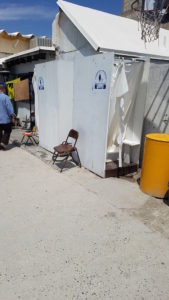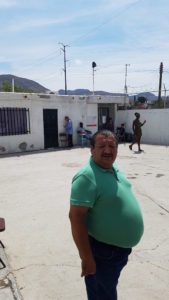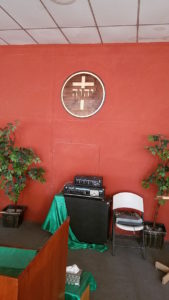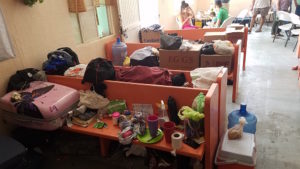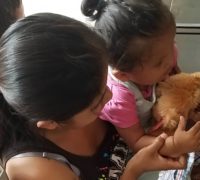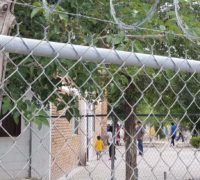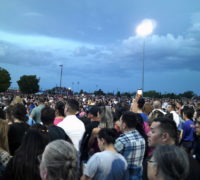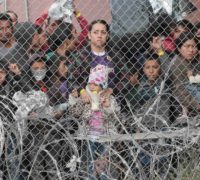Ciudad Juarez, Mexico — In the span of about 18 hours, we’ve moved from bearing witness to a vigil remembering the lives of 22 Hispanic victims of a white nationalist killer in an El Paso Walmart to a dusty, back street center for migrants where one can practically see the heat rising in waves.
There are people back home who know about the journey I’d be taking with JSurge founder Rabbi Steven Bayar. More than one posts on social media, “what should we do with those people (the migrants), put them up in a Hilton?”
Along a route pockmarked with rutted roads and bordered by crumbling houses, we checked into the “Hilton” my Facebook “friend” asked about.
Albergue Para Migrantes (Hostel For Migrants) has two temporary, barely private outdoor showers and four toilets to service about 100 migrants. The showers are the type FEMA might deliver to an area beset by natural disaster. The toilets work…but not all of the time.
Calling the walled-in courtyard a playground for children would be a difficult stretch. Other than a cracked surface in which to play, the children look up and see razor wire surrounding the small compound. Blanched by the sun, there seems to be little comfort to find anywhere.
Most of the dormitory space houses rows of bunkbeds, so close together that one could walk across the room on mattresses not touching the ground. An errant plastic toy car turned over on its side on a blanket is the only evidence of “fun” to be found.
In another part of the building, the pews of a sanctuary are used as places to sleep or are turned into tables where migrants keep everything from deodorant to tooth paste to clothing. Very visible on a wall is a cross with the word in Hebrew for Adonoi or God.
Yet for the families who come to Juarez, seeking asylum in the United States, these conditions are preferable to the sex trafficking, femicide (killing of women) and gang violence they’ve witnessed in Mexico, Central America and elsewhere.
For anyone to compare this compound to a hotel chain has Pharaoh’s heart.
Since September, 2017, when Pastor Juan Fierro opened the migrant center, he has provided beds, meals and clothing for over 2,500 migrants.
The Pastor told JSurge that in addition to Central American migrants, he has seen an increase coming to the border of refugees coming from Uganda, Cameroon, Ethiopia and the Congo.
On this hot day in early August, we visited Albergue Para Migrantes with Dr. Eva Moya, a University of Texas at El Paso associate professor, and Margarita Zarate, a GED instructor who makes her home in Juarez.
Zarate has enlisted the help of a nephew and his girlfriend to help us deliver basic commodities such as cleaning supplies, toilet paper, underwear and shoes to the center using funds provided by JSurge.org and The Good People Fund.
Remember Margarita’s name for a moment longer. She is delivering these supplies while at the same time knowing that her daughter-in-law is experiencing a difficult fifth month of pregnancy far away in North Carolina. The unborn baby’s life might be in danger. Yet, Margarita is serving desperate people in a forgotten neighborhood.
Pastor Fierro is an emotional and strong man. He has committed his mission to the dispossessed.
“We have seen the presence of the Lord,” the Pastor tells us. “And that presence this day is that the air conditioning is working in the office.”
Almost every word that comes from the Pastor is God speak.
“When they come to us, they are totally exhausted emotionally and physically,” he said. “They become a little more relaxed here. We want to help them stabilize themselves.”
He added that migrants can stay for days or months while they await word of their possible asylum or more probable journey to the homelands they fled.
“We’re very fortunate that everyone gets along,” he added. “There’s no arguing, there’s no fighting while they transition and leave.”
Migrants help clean and cook. There is also an empty building across the street that needs a new roof. The Pastor takes us to show us the space. We see a structure pretty much in disrepair. There is a pile of blankets reaching halfway to the ceiling, and extra mattresses piled on the floor. A migrant is supervising other migrants in the clean up and what will be much needed renovations before any people can shelter there.
This was the second stop of several we’d be making in both Juarez and El Paso. The picture that most Americans will never see of men, women and children awaiting a decision that will impact their lives in conditions that are difficult to bear, is at best daunting and worst hopeless.
It would emotionally get worse.
Margarita screams an awful, painful scream. She had just received a text. Her son and daughter-in-law’s baby’s heart stopped beating. The baby’s life could not be saved.
This is when Pastor Fierro showed his emotional strength and faith. He formed a prayer circle with Margarita and the others in the room. In Spanish, the Pastor prayed with tears and conviction. Rabbi Bayar prayed El Maleh Rachamim, the traditional Jewish prayer for a departed soul. When the prayers were completed, Margarita was still understandably heart broken. But then she went ahead and sorted more products out for the migrants.
It was a real life moment of a woman living her faith. An unforgettable moment.
The tour after Margarita learned her sad news became a great deal more subdued.
We’d learn that at least two migrant children were in quarantine for measles exposure.
“God provides for us,” said the Pastor. “Little by little we serve them.
“We do our best.”
We ride back to El Paso in stunned silence.
Click on a photo in the gallery to view a larger size.
All photos provided by Phil Jacobs



